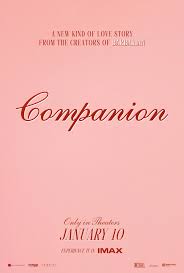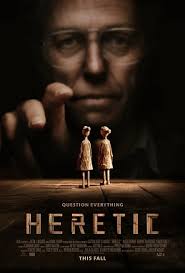Displaying items by tag: Sophie Thatcher
Companion

COMPANION
US, 2025, 97 minutes, Colour.
Sophie Thatcher, Jack Quaid, Lucas Gage, Megan Suri, Harvey Guillen, Rupert Friend, Mark Mancaka.
Directed by Drew Hancock.
At the end of watching Companion, this reviewer was very happy to have had no knowledge at all of what the film was about or what it was like. And, checking on the number of reviews as well as strong opinions from bloggers, most were pleased that they went in to see Companion cold and found it an engrossing and unexpected experience.
Which, possibly, is where a review of Companion should end. But, it is probably fair to say that in the first few minutes, we are introduced to a very interesting character, Iris, played by Sophie Thatcher (Heretic, Yellowjacket) in a supermarket romantic comic episode involving the collapsing of the oranges shelf, then a startling remark by Iris, the introduction of the tall handsome, Josh, Jack Quaid. Then, off we go…
Sophie Thatcher is very effective in keeping pace with the various facets of her character.
One all the best aspects of Companion is that we do not know where the film is leading. And, there are quite a number of surprises in the screenplay, some misleading, some turns, some twists as the plot unrolls, unravels. And, we are not really sure until the final credits.
There are some good roles from the supporting cast, especially Lucas Gage and Harvey Guillen, sometimes comic, sometimes serious, and nasty Russian businessmen played by Rupert Friend in heavy moustachioed disguise.
In fact, there is quite a lot to think about as we watch Companion.
And, compliments to writer-director, Drew Hancock, who keeps control of his screenplay as well as of the responses of the audience.
- The title, the focus on Iris, her relationship with Josh, the revelation that she was a robot, her construction, the instructions for her behaviour, companion, sexual partner? The ironies of the complications and the confrontations?
- The American setting, the opening in the supermarket, the apartment, out in the open road, the scenery, the forests? The holiday house and the interiors? The chases through the forest? The musical score?
- The romantic comedy tone of the opening, Iris, shopping, doll -like, Josh, the encounter with the fallen oranges, iris voice-over, the attraction, and the intimation that she would kill Josh?
- The situation, driving to the house, Sergey and his Russian background, the owner, luxury? The presence of Kat and her surly attitudes? Patrick and Eli and the relationship? Sociable, the pool, her assent, her clothes, the drinking, the dancing? The morning after? Josh urging Iris to go out to the pool, meeting Sergey? His approach, her warning him off, her having the knife, killing him? And the audience gradually realising that this was the setup?
- The revelation of the project, Josh and Kat, the company, the robots, the specifications, the plan to rob Sergey, the murder, using Eli? And the revelation that Patrick was also a robot?
- Audience response to Iris, her personality, her robot personality, her love for Josh, unable to lie, the background of the company, the interviews, Sid and Teddy and the later interventions?
- Josh, the revelation, his personality, greed, his inferiority, motivations, Kat and her personality and motivations? The emotional complications, Eli and Patrick and their contribution?
- Iris, the situation, her being able to be turned on and off, yet the innate shrewdness of the programming, the confrontations, the drama in the house, her escape, the pursuit through the forests, the hiding, eluding the pursuers?
- The pursuit, Josh in the forest, and Patrick, being able to turn Patrick on and off, Josh and the reprogramming of Patrick? Patrick as a vengeful robot, Eli and his being shot, the final relationship with Patrick?
- The complications and the pursuit, iris using her wits, the return to the house, the contact with the company, bringing the replacement, Teddy and the pursuit?
- The transition from science-fiction to the slasher mode, the role of Patrick, his different personality, manipulated, vengeful? And the final confrontation with Josh and his defeat?
- Audiences enjoying the thriller, slasher aspects? The interest in the science fiction themes, robotics, programming, and the focus on self-indulgent men, their inadequacies, needing programmed robots for their satisfaction and gratification? And the defeat by female ingenuity, and by the programming?
Heretic

HERETIC
US, 2024, 111 minutes, Colour.
Hugh Grant, Sophie Thatcher, Chloe East, Topher Grace.
Directed by Scott Beck, Bryan Woods.
An arresting title. Heresy – but heresy from what faith?
It is not easy to categorise this thriller. On the one hand, there will be an audience who wants to see it as a horror film, an insane male character terrorising two young women, confining them in his house, continued threats, violence. And, this audience will be aware that there is a lot of religious discussion during the film but they will not find this very interesting, hearing it but not particularly taking note of it. The thriller tension is what is important.
On the other hand, there will be an audience who listens attentively to all the dialogue, the focus on churches, on religion itself, unbelief and its consequences – all presented in the context of a thriller of menace and ultimate violence.
And, this thriller is particularly different because of the presence of Hugh Grant. He has played some villains in recent films and television series but here he returns to the style that he used in so many of his romantic comedies. There are his sometimes stumbling manner, his ironic grimaces and self-deprecation, his immediate charm. But, as the narrative goes on, this becomes a very sinister charm.
One of the arresting aspects of the film is that it initially focuses on the Church of Latter Day Saints, the Mormons. (In fact, film information notes that the two actresses were brought up as Mormons, though no longer belonging to the church, and so know from the inside how they should play their roles.) They are young, earnest, chatting together initially about personal attitudes, one finding that watching a pornographic film confirms her belief in God, the of the more wary. And, they are ignored in the town as they offer leaflets, mocked by a group of girls wanting a self it with them.
But, their appointment is with Mr Reed who has told the church he is interested in Mormon beliefs. And so, Hugh Grant, Mr Reed, charming and welcoming, the girls cautious because they need to have another woman in the room with them, Mr Reed promising his wife in the kitchen, making blueberry pie, will join them. Of course, she does not. And, while he has trapped the girls, he continues with his conversation, asking them about their faith, talking about his religious investigations, studies and essays, all the time reassuring them even though they become more and more anxious, pretending to ring the church for rescue.
So, interest in the film will depend on how much audiences want to see as the menace continues, the consequences for the young women, trapped, wanting to escape, and, indeed, going down to the basement and discovering another weirdly sinister world. And the young women using their wits in desperate situations.
Those following the dialogue will be both enlightened and confused as it develops, Mr Reed using songs like The Air I Breathe and board games like Monopoly and the changes with further “iterations” as illustrations of how original experiences of faith lose their strength and power with further iterations. And he does come up with a solution, even as he horrifies the women and ourselves as we discover his secret and weird belief in raising women “prophets” from the dead. Control is his final answer, all the nature and core of all religion being control.
Audiences were not quite expecting this one!
1. Title, religious themes?
2. Orthodoxy and heterodoxy?
3. The Church of Latter Day Saints context, as a church, Joseph Smith and his testing religions, forming his own, his personal life, issue of polygamy, changing laws, evangelisation, sisters and brothers going out to visit, the Church authorities?
- The film as a psychological thriller, as a religious/religion-oriented thriller?
- The presence of Hugh Grant, his reputation, his acting style, his charm and idiosyncrasies, grimaces, eyebrows… Used to different advantage here?
- The plausibility of the plot, the church, the missionaries, their behaviour? Mr Reed and his house, his initial manner, the deception, the control, the discussions about the true religion, God, the trapping of the women in the house, the issue of raising from the dead, the revelation of the truth, Mr Reed and his believe in that true religion is control?
- The introduction to the two missionaries, the huge mountain, the seat, chat, the discussion about pornography, and the reinforcement faith? Sister Barnes and her reaction? Moving through the town, ignored by people, the girls with the photo and pulling sister Paxton’s skirt, climbing the steps, returning, the bikes, going to the Reed house, the appointment?
- Hugh Grant as Mr Reed, the welcome, the sympathy about Mormonism, the offering pie, the promise to meet his wife, her shyness, the drink, the candles? Taking their coats? The revelation about locking the bikes, the key in the wrong pocket? The beginning of the uneasiness?
- The thriller aspect, the women trapped, time passing, the pretence about phone calls, yet his saying that there was metal in the walls, no phone, the mechanism for locking the door? The possibly leaving at the back, the house built on the cliff, the two doors, belief in disbelief, his taunting them, the going down into the basement, the consequences in the basement, the apparition of the old woman, eating the pie, her death, the plan for her resuscitation? The desperation of the young women, the device of trying to get the matches?
- The theological aspect, audience interest in Mormonism, its history, Joseph Smith, his own behaviour, the comments about polygamy and the changing of the law, polygamy for promoting more children in the church? The further conversations about the different churches, about God, about belief, the testing of the girls? Mr Reed and his explanations about his study, the range of books on his library, his essays, his explorations, his playing of the music, The Air I Breathe, and his theory of iterations, from the original through the various developments, moving away from the original insight? The example of Monopoly on the boardgames in the developments?
- In the basement, Sister Paxton attacking Reed, his slashing Sister Barnes, her bleeding out, her coming again, bashing Mr Reed? Sister Paxton, the confrontation of ideas with Reed, her astuteness in noticing things, her escape, through the various doors, the discovery of the women in cages, his controlling them? Her shrewdness in noting what had happened, the conclusion of religion was Control? His agreement, the attack by Sister Barnes, her death? Sister Paxton and her working out that his control was to make them think that they were in control while he controlled them?
- The background of the elder, in the church, checking on the girls and their return to headquarters, his going to visit Mr Reed, his return with the pamphlet?
- The uncertain ending, the effect on Sister Paxton, Reed and his beliefs, control, his Satan -like theories?